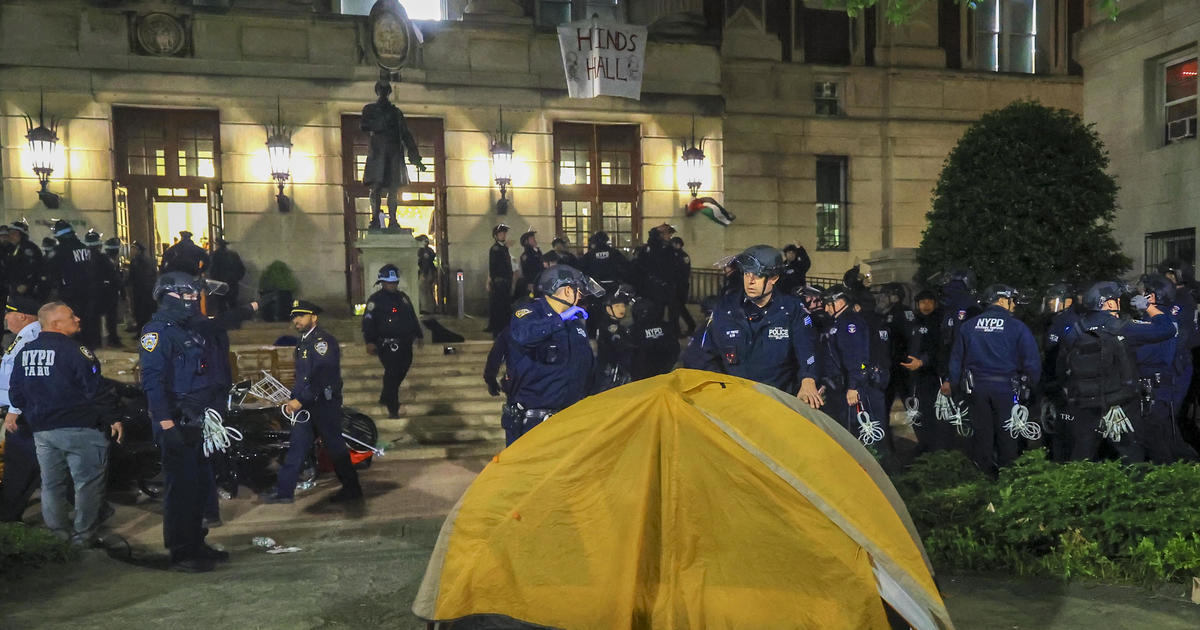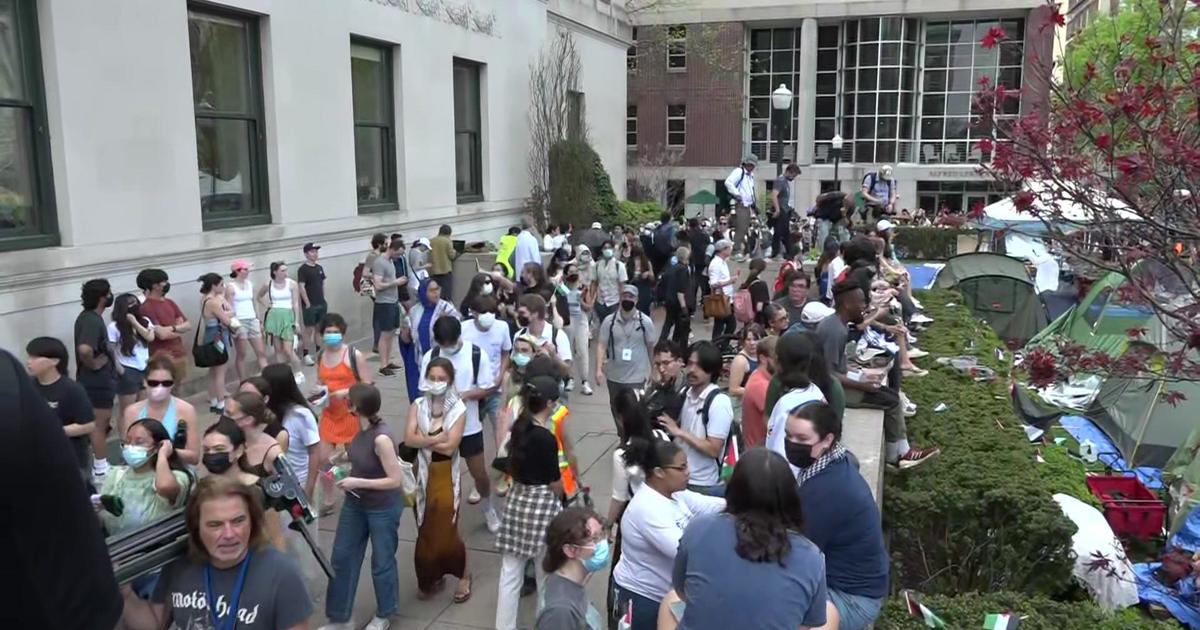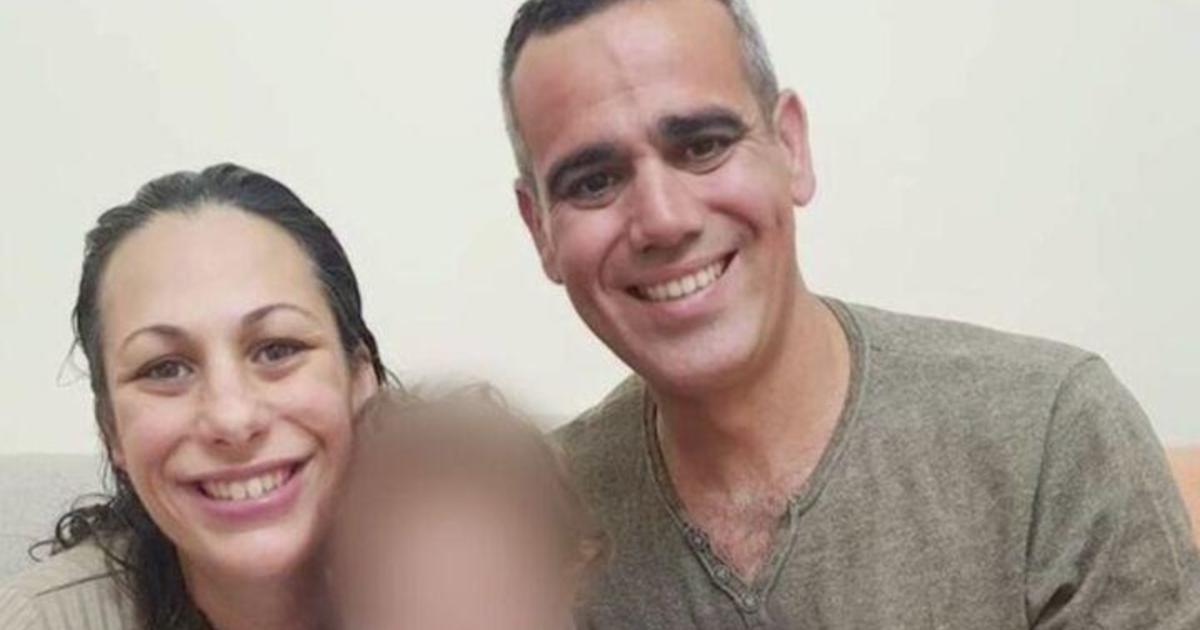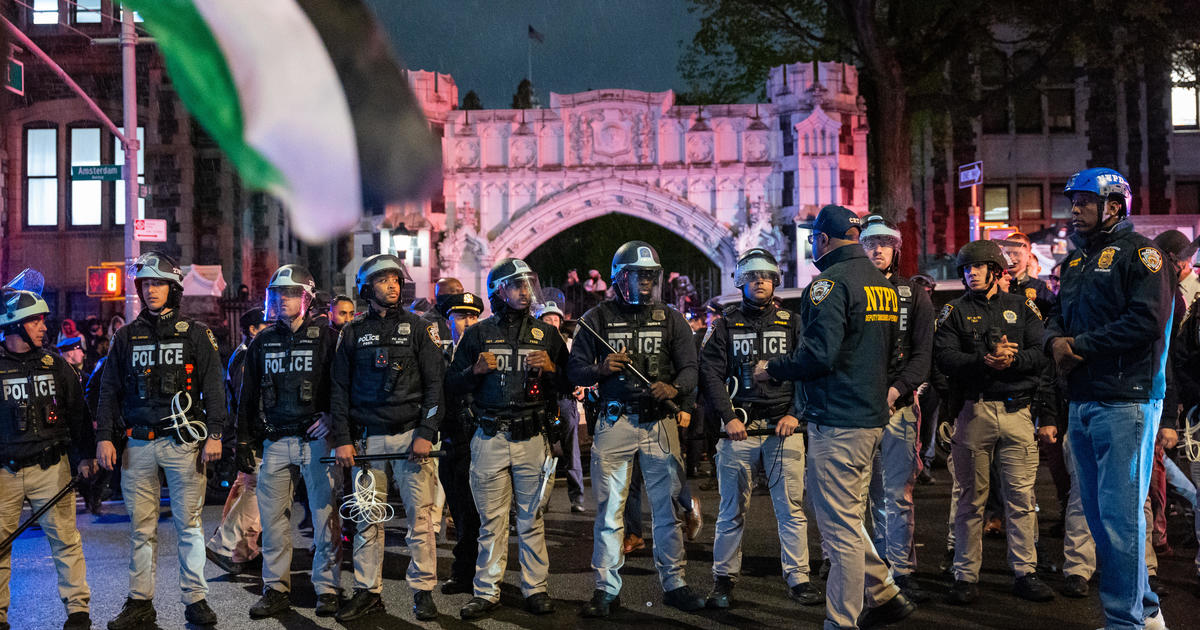GOP & Democrats Signal No Sign Of Retreat In First Day Of Shutdown
WASHINGTON (CBSNewYork/CBS News/AP) -- After a rare Saturday session, Congress called it a night without finding a way to end the government shutdown.
Negotiations to pass a new spending bill have stalled, and there's no end in sight. As CBS2's Lisa Rozner reported, lawmakers spent much of the day blaming each other, unable to overcome the dysfunction and discord that triggered the shutdown in the first place.
"We'll be right back at this tomorrow and for as long as it takes," Senate Majority Leader Mitch McConnell said.
The federal government shut down at the stroke of midnight Friday, halting all but the most essential operations and marring the one-year anniversary of President Donald Trump's inauguration in a striking display of Washington dysfunction.
Last-minute negotiations crumbled Friday as Senate Democrats blocked a four-week stopgap extension in a late-night vote, causing the fourth government shutdown in a quarter century. Behind the scenes, however, leading Republicans and Democrats were trying to work out a compromise to avert a lengthy shutdown.
Congress gathered for an unusual Saturday session to begin considering a three-week version of the short-term spending measure -- and to broadcast that they were at work as the shutdown commences. It seemed likely each side would try forcing votes aimed at making the other party look culpable for shuttering federal agencies.
Since the closure began at the start of a weekend, many of the immediate effects will be muted for most Americans. But any damage could build quickly if the closure is prolonged. And it comes with no shortage of embarrassment for the president and political risk for both parties, as they wager that voters will punish the other at the ballot box in November.
Social Security and most other safety net programs are unaffected by the lapse in federal spending authority. Critical government functions will continue, with uniformed service members, health inspectors and law enforcement officers set to work without pay. But if no deal is brokered before Monday, hundreds of thousands of federal employees will be furloughed.
The latest proposal would fund the government for three more weeks in exchange for a guaranteed vote in the Senate on the Deferred Action for Childhood Arrivals, or DACA, the program that allows young people brought to the country illegally as children to live and work in the United States. But Democrats are worried the bill will then die in the House.
"Give us a vote in the Senate and guarantee us a vote in the House," said Rep. Louis Gutierrez, D-Illinois. "If you have a vote in the Senate, it means absolutely nothing, because you have stalemate."
Senate Minority Leader and New York Democrat Chuck Schumer, who met with the president on Friday, is now calling this a "Trump shutdown," claiming he put a deal on the table that would include the controversial border wall.
"Negotiating with this White House is like negotiating with Jell-O. It's next to impossible," he said.
But Republicans call it a "Schumer shutdown."
"Senator Schumer shut down the government," Sen. Darrell Issa said.
"This is really all on Schumer," said Sen. Kevin McCarthy.
"If you're concerned about opiate addictions and crisis in this country, as Senator Schumer said he was last night, if you're concerned about our military, you don't gain or advance anything by shutting down the government," Sen. Corey Gardner said.
"At this point, we feel very, very strongly about the issues – not just Dreamers, but opioids, pensions, not funding the military on a CR basis -- and we feel the American people are on our side," countered Schumer.
Read More: So, What Does A Government Shutdown Mean For You?
After hours of closed-door meetings and phone calls, the Senate scheduled its late-Friday night vote on a House-passed plan. It gained 50 votes to proceed to 49 against, but 60 were needed to break a Democratic filibuster. A handful of red-state Democrats crossed the aisle to support the measure, rather than take a politically risky vote. Four Republicans voted in opposition.
In an unusual move, Senate Majority Leader Mitch McConnell allowed the roll call to exceed two hours-- instead of the usual 20 or so -- and run past midnight, seemingly accommodating the numerous discussions among leaders and other lawmakers. Still as midnight passed and the calendar turned, there was no obvious off-ramp to the political stalemate.
"This is the One Year Anniversary of my Presidency and the Democrats wanted to give me a nice present," the president tweeted early Saturday, also claiming they are "more concerned with Illegal Immigrants than they are with our great Military or Safety at our dangerous Southern Border."
Even before the vote, Trump was pessimistic, tweeting that Democrats actually wanted the shutdown "to help diminish the success" of the tax bill he and fellow Republicans pushed through last month. White House press secretary Sarah Sanders later termed the Democrats "obstructionist losers."
"This is no way to conduct the nation's business," Senate Minority Leader Chuck Schumer said late Friday. "Republicans know it. Democrats know it. The American people know that this party is not capable of governing."
Democrats balked on the measure in an effort to pressure on the White House to cut a deal to protect "dreamer" immigrants -- who were brought to the country as children and are now here illegally -- before their legal protection runs out in March.
The president watched the results from the White House residence, dialing up allies and affirming his belief that Democrats would take the blame for the shutdown, said a person familiar with his conversations but not authorized to discuss them publicly.
Predictably, both parties moved swiftly to blame one another. Democrats laid fault with Republicans, who control both chambers of Congress and the White House and have struggled with building internal consensus. Republicans declared Democrats responsible, after they declined to provide the votes needed to overcome a filibuster over their desire to force the passage of legislation to protect some 700,000 younger immigrants from deportation.
Republicans branded the confrontation a "Schumer shutdown" and argued that Democrats were harming fellow Americans to protect "illegal immigrants." Schumer said a "Trump shutdown" was more accurate.
Earlier Friday, Trump had brought New York's senior senator to the White House in hopes of cutting a deal on a short-term spending agreement.
The two New Yorkers, who pride themselves on their negotiating abilities, started talking over cheeseburgers about a larger agreement that would have included greater military spending and money for a southern border wall.
But the talks fell apart almost as abruptly as they started. In a phone call hours later, the president raised new concerns about the deal he and Schumer had discussed, according to a person familiar with the conversation. In a subsequent phone call with Schumer, chief of staff John Kelly said the deal discussed was too liberal. The White House did not immediately comment on that account.
"Hours later, I got a phone call telling me this is not good enough," Schumer said.
White House officials said the senator shouldn't expect a deal on DACA anytime soon.
"When they reopen the government, we will continue the discussions," said White House Legislative Affairs Director Marc Short.
Budget Director Mick Mulvaney told CNN that "Not much has changed" over the course of the day, but he predicted a deal would be reached by Monday, when most government offices are to reopen after the weekend.
Democrats in the Senate had served notice they would filibuster the government-wide funding bill that cleared the House Thursday evening. They were seeking an even shorter extension that they think would keep the pressure on the White House to cut a deal to protect the "dreamer" immigrants.
"We will not negotiate the status of unlawful immigrants while Democrats hold our lawful citizens hostage over their reckless demands," Sanders said in a statement.
Trump first described his discussion with Schumer as an "excellent preliminary meeting," tweeting that lawmakers were "making progress - four week extension would be best!" But that optimism faded as the evening wore on. McConnell did not attend the meeting because he was not invited, a Senate GOP aide said.
Trump had been an unreliable negotiator in the weeks leading up to the showdown. Earlier this week he tweeted opposition to the four-week plan, forcing the White House to later affirm his support. He expressed openness to extending the Deferred Action for Childhood Arrivals program, only to reject a bipartisan proposal. His disparaging remarks about African and Haitian immigrants last week helped derail further negotiations.
Trump had been set to leave Friday afternoon to attend a fundraiser at his Palm Beach, Florida, estate marking the one-year anniversary of his inauguration but delayed his travel.
As word of the Schumer meeting spread, the White House hastened to reassure Republican congressional leaders that Trump would not make any major policy concessions, said a person familiar with the conversations but not authorized to be quoted by name.
On Capitol Hill, McConnell said Americans at home would be watching to see "which senators make the patriotic decision" and which "vote to shove aside veterans, military families and vulnerable children to hold the entire country hostage... until we pass an immigration bill."
"We can't keep kicking the can down the road," said Schumer, insisting on more urgency in talks on immigration. "In another month, we'll be right back here, at this moment, with the same web of problems at our feet, in no better position to solve them."
The four-week measure would have been the fourth stopgap spending bill since the current budget year started in October. A pile of unfinished Capitol Hill business has been on hold, first as Republicans ironed out last fall's tax bill and now as Democrats insist on progress on immigration. Talks on a budget deal to ease tight spending limits on both the Pentagon and domestic agencies are on hold, as is progress on a huge $80 billion-plus disaster aid bill.
Before Thursday night's House approval, GOP leaders sweetened the stopgap measure with legislation to extend for six years a popular health care program for children from low-income families and two-year delays in unpopular "Obamacare" taxes on medical devices and generous employer-provided health plans.
A shutdown would be the first since 2013, when tea party Republicans -- in a strategy not unlike the one Schumer is employing now -- sought to use a must-pass funding bill to try to force then-President Barack Obama to delay implementation of his marquee health care law. At the time, Trump told Fox & Friends that the ultimate blame for a shutdown lies at the top. "I really think the pressure is on the president," he said.
Arguing that Trump's predecessors "weaponized" that shut down, Mulvaney said Friday the budget office would direct agencies to work to mitigate the impact this time. That position is a striking role-reversal for the conservative former congressman, who was one of the architects of the 2013 shutdown over the Affordable Care Act.
Republicans plan on keeping everyone late Sunday, as the next vote isn't scheduled until 1 a.m. Monday.
In the meantime, Schumer is calling for another meeting with Trump. The president was supposed to be in Mar-a-Lago for a fundraiser Sunday but cancelled his appearance to stay in Washington.
(© Copyright 2017 CBS Broadcasting Inc. All Rights Reserved. The Associated Press contributed to this report.)



